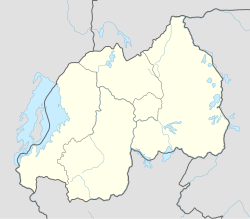
The International Criminal Tribunal for Rwanda was an international court established in November 1994 by the United Nations Security Council in Resolution 955 in order to adjudicate people charged for the Rwandan genocide and other serious violations of international law in Rwanda, or by Rwandan citizens in nearby states, between 1 January and 31 December 1994. The court eventually convicted 61 individuals and acquitted 14.

The Rwandan Patriotic Front is the ruling political party in Rwanda.

The Rwandan genocide, also known as the genocide against the Tutsi, occurred between 7 April and 19 July 1994 during the Rwandan Civil War. During this period of around 100 days, members of the Tutsi minority ethnic group, as well as some moderate Hutu and Twa, were killed by armed Hutu militias. Although the Constitution of Rwanda states that more than 1 million people perished in the genocide, the demographic evidence suggests that the real number killed was likely lower. The most widely accepted scholarly estimates are around 500,000 to 662,000 Tutsi deaths.
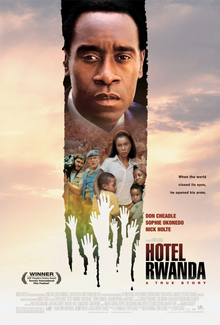
Hotel Rwanda is a 2004 docudrama film co-written and directed by Terry George. It was adapted from a screenplay by George and Keir Pearson, and stars Don Cheadle and Sophie Okonedo as hotelier Paul Rusesabagina and his wife Tatiana. Based on the Rwandan genocide, which occurred during the spring of 1994, the film documents Rusesabagina's efforts to save the lives of his family and more than 1,000 other refugees by providing them with shelter in the besieged Hôtel des Mille Collines. Hotel Rwanda explores genocide, political corruption, and the repercussions of violence.

Radio Télévision Libre des Mille Collines (RTLM), nicknamed "Radio Genocide" was a Rwandan radio station which broadcast from July 8, 1993, to July 31, 1994. It played a significant role in inciting the Rwandan genocide that took place from April to July 1994, and has been described by some scholars as having been a de facto arm of the Hutu government.
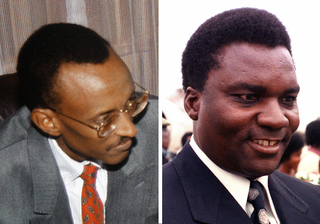
The Rwandan Civil War was a large-scale civil war in Rwanda which was fought between the Rwandan Armed Forces, representing the country's government, and the rebel Rwandan Patriotic Front (RPF) from 1 October 1990 to 18 July 1994. The war arose from the long-running dispute between the Hutu and Tutsi groups within the Rwandan population. A 1959–1962 revolution had replaced the Tutsi monarchy with a Hutu-led republic, forcing more than 336,000 Tutsi to seek refuge in neighbouring countries. A group of these refugees in Uganda founded the RPF which, under the leadership of Fred Rwigyema and Paul Kagame, became a battle-ready army by the late 1980s.
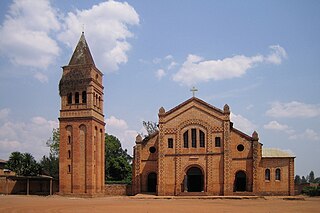
Christianity is the largest religion in Rwanda, with Protestantism and Catholicism being its main denominations. Around 3% of the population claims no religious affiliation, while another 3% practices other religions including traditional faiths. Approximately 2% of the populace is Muslim.
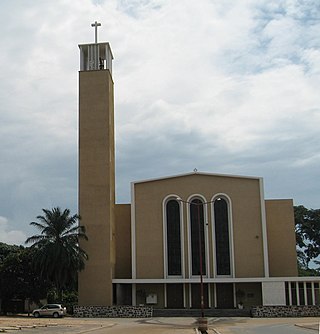
Religion in Burundi is diverse, with Christianity being the dominant faith. Catholicism is the largest Christian denomination in the country.
Rwandan genocide denial is the pseudohistorical assertion that the Rwandan genocide did not occur, specifically rejection of the scholarly consensus that Rwandan Tutsis were the victims of genocide between 7 April and 19 July 1994. The perpetrators, a small minority of other Hutu, and a fringe of Western writers dispute that reality.
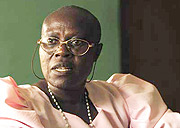
Valérie Bemeriki is a Rwandan convicted war criminal and radio entertainer. Bemeriki was one of the main animatrices of Radio Télévision Libre des Mille Collines (RTLM), which played a significant role in promoting the genocide against the Tutsi.

Sainte-Famille Church is a Catholic church in Muhima, downtown Kigali, in Rwanda. It is located on a hill, close to the cell of Rugenge. Sainte-Famille Church was the scene of killings during the genocide in April 1994.
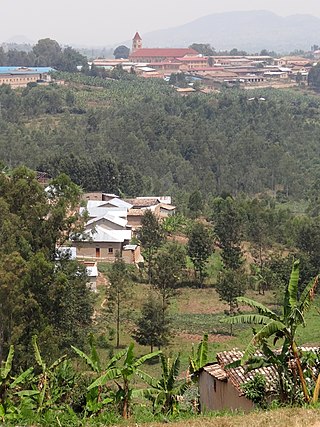
Kabgayi is located just south of Gitarama in Muhanga District, Southern Province, Rwanda, 25 miles (40 km) southwest of Kigali. It was established as a Catholic Church mission in 1905. It became the center for the Roman Catholic Church in Rwanda and is the site of the oldest cathedral in the country and of Catholic seminaries, schools and a hospital. The church at first supported the Tutsi ruling elite, but later backed the Hutu majority. During the 1994 Rwandan genocide thousands of Tutsis who had taken refuge here were killed. Some survivors admire the courage of many priests who helped them during those difficult days, like Father Evergiste RUKEBESHA and many others. Later, some Hutus including three bishops and many priests were killed by the rebels RPF soldiers. A mass grave beside the hospital is marked by a memorial. Inside the Basilica are kept the bodies of the three bishops killed by FPR rebels. Two of them were refused by the Rwandan government to be transferred in their own cathedrals.

Archbishop André Perraudin, M. Afr. was a Swiss Catholic clergyman who lived in Rwanda for nearly fifty years. He was Archbishop of Kabgayi from 1959 to 1989.
Rubengera, also known as Mabanza, is a town and sector in Rwanda. The town is the capital of Karongi District in Western Province, Rwanda.
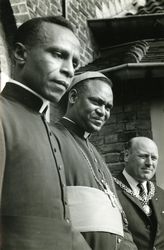
Wenceslas Kalibushi was a Rwandan Catholic bishop.
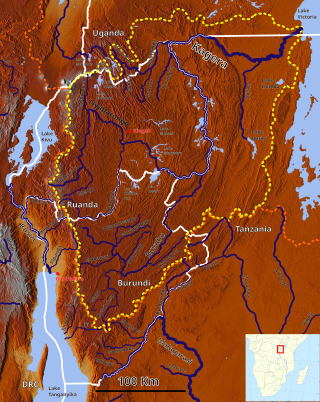
The Mwogo River is a river in western Rwanda that is a tributary of the Nyabarongo River.
During the Rwandan genocide of 1994, over the course of 100 days, up to half a million women and children were raped, sexually mutilated, or murdered. The International Criminal Tribunal for Rwanda (ICTR) handed down the first conviction for the use of rape as a weapon of war during the civil conflict, and, because the intent of the mass violence against Rwandan women and children was to destroy, in whole or in part, a particular ethnic group, it was the first time that mass rape during wartime was found to be an act of genocidal rape.
Ganwa is the name for the princely group that traditionally ruled Burundi. They formed a distinct social class that was neither Hutu nor Tutsi, although they were affiliated with the latter. They have launched several appeals to be recognized as a distinct socio-cultural grouping.

Genocide is the intentional destruction of a people in whole or in part. The term was coined in 1944 by Raphael Lemkin. It is defined in Article 2 of the Convention on the Prevention and Punishment of the Crime of Genocide (CPPCG) of 1948 as "any of the following acts committed with intent to destroy, in whole or in part, a national, ethnical, racial, or religious group, as such: killing members of the group; causing serious bodily or mental harm to members of the group; deliberately inflicting on the group's conditions of life, calculated to bring about its physical destruction in whole or in part; imposing measures intended to prevent births within the group; [and] forcibly transferring children of the group to another group."
